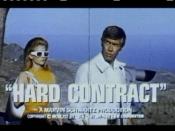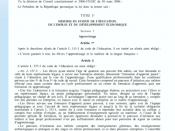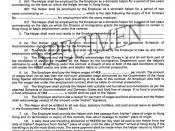Parties:Vanderbilt University (Plaintiff/Appellee) v.Gerry DiNardo(Defendant/Appellant)
Facts: On December 3, 1990, Vanderbilt and DiNardo executed an employment contract hiring DiNardo to be Vanderbilt's head football coach. On August 14, 1994, Paul Hoolahan, Vanderbilt's Athletic Director, went to Bell Buckle, Tennessee, where the football team was practicing, to talk to DiNardo about a contract extension. In November 1994, Louisiana State University contacted Vanderbilt in hopes of speaking with DiNardo about becoming the head football coach for L.S.U. Hoolahan gave DiNardo permission to speak to L.S.U. about the position. On December 12, 1994, DiNardo announced that he was accepting the L.S.U. position. Vanderbilt sent a demand letter to DiNardo seeking payment of liquidated damages under section eight of the contract. Vanderbilt believed that DiNardo was liable for three years of his net salary: one year under the original contract and two years under the Addendum. DiNardo did not respond to Vanderbilt's demand for payment.
History: Vanderbilt brought the action against DiNardo for breach of contract. DiNardo removed the action to federal court, and both parties filed motions for summary judgment. The district court held that section eight was an enforceable liquidated damages provision, not an unlawful penalty, and that the damages provided under section eight were reasonable. The court held that Vanderbilt did not waive its contractual rights under section eight when it granted DiNardo permission to talk to L.S.U. and that the Addendum was enforceable and extended the contract for two years. The court entered judgment against DiNardo for $281,886.43. Dinardo appeals to U.S. District court.
Issues: Is section 8 of the contract an enforceable liquidated damage provision and not an unlawful penalty under Tennessee law and did Vanderbilt waive its right to liquidated damages? Was the Addendum to the contract enforceable? Was the Addendum not a valid and binding...


